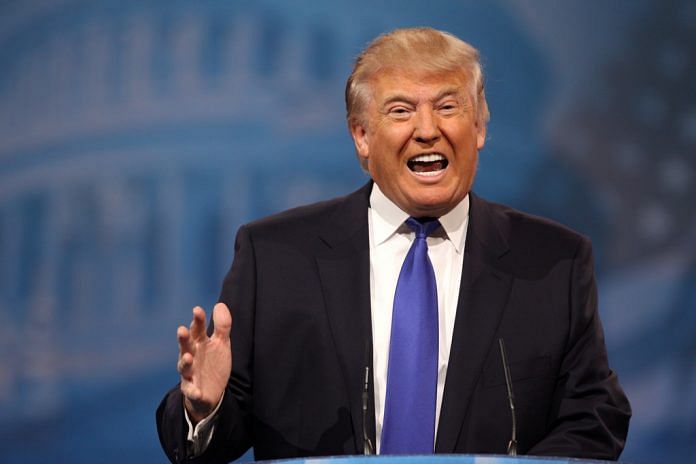Urgently needed: Unimpeachable evidence to impeach Trump
There was one ad in the Sunday edition of The Washington Post which was hard to miss. That it took up one whole page was only partly the reason.
“$10 million for information leading to the impeachment and removal from office of Donald J. Trump,” the ad declared in bold, all-caps text.
From “compromising domestic and foreign policy with his massive conflicts-of-interest global business empire” to “telling hundreds of bald-faced lies” to “gross nepotism and appointment of unqualified persons to high office,” Larry Flynt delineated all the reasons why Trump must go.
“Impeachment would be a messy, contentious affair, but the alternative – three more years of destabilising dysfunction – is worse. Both good Democrats and good Republicans who put country over party did it before with Watergate. To succeed, impeachment requires unimpeachable evidence. That’s why I’m making this offer: buried in Trump’s top-secret tax returns or in other records of his far-flung investments there may be a smoking gun. Did he make some financial quid prop quo with the Russians? Has the business of the United States been compromised to protect the interest of the Trump empire? We need to flush everything out into the open.”
The ad ends with a toll-free number and an email address, along with a reassurance that Flynt, better known as the publisher of the pornographic magazine Hustler, genuinely means to pay the full sum of $10 million for valuable information.
Europe shifts further Right-ward
As Austria’s nationalist Freedom Party geared up to return to power for the first time since 2005, congratulations poured in from European nationalists including France’s Marine Le Pen and Geert Wilders in the Netherlands. Obviously, not everyone is happy.
“The swell of anxiety over immigration to Austria began building 2015, when almost 70,000 mostly-Muslim refugees sought asylum from war-torn countries such as Syria, Afghanistan and Iraq. Schools and hospitals in the nation of 8.7 million struggled to accommodate the newcomers, and disagreements over whether it was fair to give immigrants generous welfare support dominate the media,” write Boris Groendahl and Jonathan Tirone in Bloomberg.
For Angela Merkel, the result would chip away at an important ally’s pro-European stance going ahead.
“Austria has mostly been an ally of Germany for decades, but that picture could change more often now,” said a political analyst.
For the World Jewish Congress, the Freedom Party’s entry into the Parliament is simply apocalyptic.
“It is sad and distressing that such a platform should receive more than a quarter of the vote and become the country’s second party,” Ronald Lauder, who heads the World Jewish Congress, said in an emailed statement. “My only hope is that they won’t end up in government.”
‘Where do we go from here?’
After two months of “we-don’t-know-where-this-is-going”, there seems to be a glimmer of hope for US-Pakistan relations. Both sides appear to be willing to re-engage, and it is this “re-engagement”, which will define their future relationship, writes Munir Akram in Dawn.
“‘Process’ will greatly influence the outcome of the re-engagement. Pakistan should insist on a clear agenda reflecting the objectives and concerns of both sides. Both should undertake to refrain from public accusations and insults,” he writes.
“The talks should be based on the principle of reciprocity. (Unilateral concessions will lead to US demands to ‘do more’.) Equivalence must be maintained in the level of interaction. Junior or mid-level US officials should not be received by Pakistan’s leaders. It diminishes their importance and weakens Pakistan’s negotiating positions
“Finally, Pakistan must not delude itself that its re-engagement will change US strategic objectives and policy,” he says.
Behind the death of the deal
“If Rex is America’s quiet diplomat, Nikki is America’s foreign policy articulator,” US State Department spokesman R.C. Hammond said. If Nikki Haley’s role in decertifying the Iran nuclear deal is anything to go by, this statement is now beyond doubt.
When Trump was forced (by Secretary of State Rex Tillerson and Secretary of Defense James Mattis) to grudgingly declare Tehran in compliance with the 2015 Iran nuclear deal in July, Haley asked Trump to let her make the case for decertification.
“Let me lay a foundation for it,” she told the President, who happily obliged, reports Politico.
“The Iran debate also afforded Haley another chance to upstage Tillerson,” given that their relationship has been fraught.
“White House officials describe the tension between the two senior diplomats as one fuelled as much by style as by ideology. ‘You have two big personalities, one person who doesn’t want to be managed and doesn’t think she reports to the other,’ one White House official said of Haley, ‘and the other who is used to being in charge and doesn’t like to be contradicted.’”
Surely, it was a consensus against the deal to which many were carefully brought around. But the consensus is one that had been “pushed, prodded and promoted by Haley for three months”.
Japan too bids goodbye to liberalism
Liberalism in Japan may soon be dead. Whatever may be the outcome of the snap election in Japan this week, it will “spell the demise of Japan’s liberal left”, writes Koichi Nakano in The New York Times.
“A conservative two-party system without real checks and balances is emerging in Japan, and the gap keeps widening between the country’s politics and the people’s preferences.”
When Shinzo Abe announced the decision to hold the election, he seemed to be coming from a position of strength.But actually “the decision was a sign of weakness — of Mr. Abe’s political weakness and also, more problematically for the country, of a crisis of representativeness in Japanese politics. Whatever the outcome of the election on Sunday, a gap is growing between voters’ policy preferences and the new conservative two-party system that seems to be emerging as the liberal-left opposition is shoved aside,” Nakano writes.



